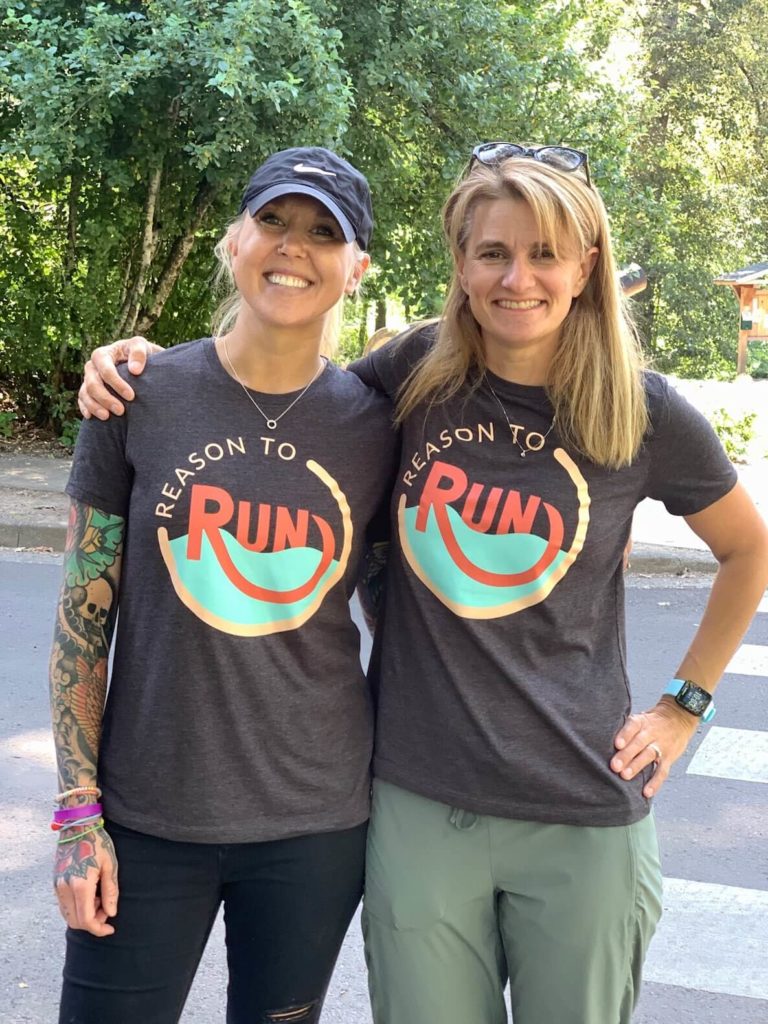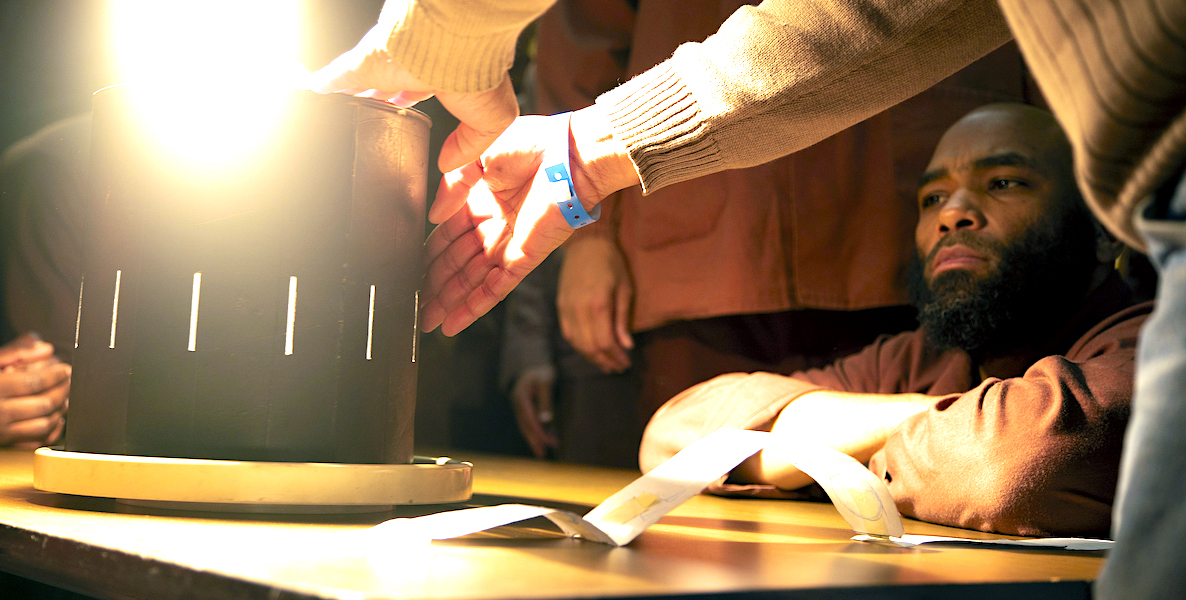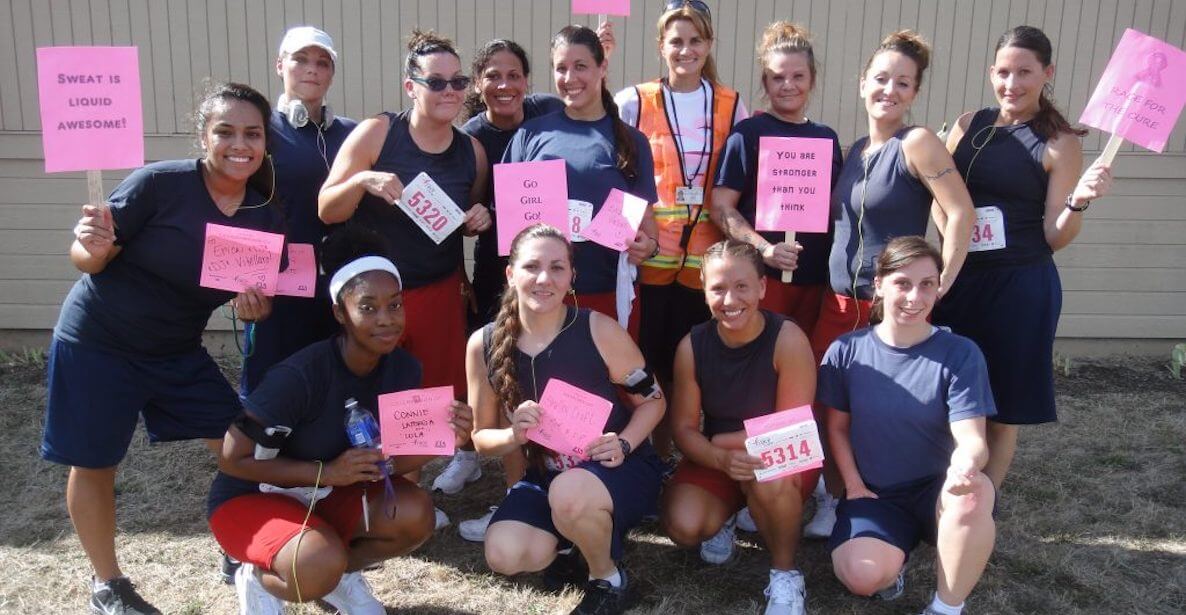For Miriam Clinton, being incarcerated in Oregon was not only isolating, but made her feel hopeless and unproductive. “I struggled a lot with relating to the other women that were there. I really didn’t connect or feel close with any of them until we were all working as a team,” says Clinton, who left the prison system more than six years ago, and is now a mother, business owner, and devoted volunteer.
But during her two-year-long incarceration, there was one prison intervention that addressed all three of these feelings—and more: Reason to Run.
Founded at Coffee Creek Correctional Facility in Wilsonville, Oregon, Reason to Run works to uplift women through, as its name implies, running. Participants train over the course of eight weeks and then compete in a race. Throughout this time, they also learn about injury prevention and building healthy relationships with themselves and others. After being released from prison, participants are encouraged to reach out to receive “run care packages” that include sneakers, socks, and sports bras, tools to help them maintain the healthy habit.
MORE ON USING SPORTS FOR TO MAKE CHANGE
There are many prison skill-building programs in place around the country, focusing on areas from cooking to art to entrepreneurship. And Reason to Run has been shown to help with both mental and physical health while women are incarcerated. In a survey by policy analyst Alicia Ward, who researched the program in-depth as part of her master’s thesis at Oregon State University, 415 out of 524 participants reported feeling happier, as well as more motivated and inspired. The group surveyed consisted of a portion of those who had participated in the program, which at the time was about 900 people total. (Data was collected through emailed surveys and feedback forms.)
All participants surveyed in 2020 who had been diagnosed with a mental health disorder reported the program having a positive impact on their mental health. Additionally, 115 people reported boosts in self-esteem and 75 reported positive physical differences, like weight loss and other changes that made them view their bodies in a more positive light. These benefits are not just temporary—the number of women surveyed who exercised daily in Coffee Creek Correctional Facility increased from 8 to 23 out of 31 women after participation in the program’s initial 5K. Clinton says that it helped her escape the pervasive isolation she felt.
“We don’t ask them to do this, but we always have a group of women join the last woman finishing her lap to cheer her on, and that is just a really cool thing to see everybody coming together,” Swanson says.
And while there is no data to say the program unequivocally reduces recidivism rates, there is extensive research about the benefits of running—increased self-efficacy, stress-relief, follow-through, confidence—that also align with factors that decrease the likelihood of recidivism. Studies have also shown running’s impacts in reducing post-traumatic stress disorder (PTSD) symptoms.
Rosie Meeks, Professor of Criminological Psychology at Royal Holloway University of London in the UK, is perhaps the foremost expert in the field of prison exercise programs. Her book, Sport in Prison: Exploring the Role of Physical Activity in Correction, is entirely focused on the positive role of various sporting initiatives in prisons; she’s also currently involved in the evaluation of a prison running program in the UK and Australia.
Her book points to the positive impact of programs like Reason to Run: “Sport can be a means through which to engage with even the most challenging and complex individuals caught up in a cycle of offending and imprisonment,” it says, “by offering an alternative means of excitement and risk-taking to that gained through engaging in offending behaviour [sic], or by providing an alternative social network and access to positive role models.”
Roots of Running
Reason to Run’s roots date back to Oregon in 2015, when founder Trisha Swanson, a certified coach with the Runner’s Club of America, was visiting prisons with a Christian group. Women there found out that she was a runner and expressed interest in running, so Swanson sent a proposal to the facility, which was approved.
The first event was a 5k in partnership with Race for the Cure, which took place on the facility’s track, and each participant donated five dollars from their personal accounts. The women enjoyed it so much that, as word spread through the facility, more asked to participate. Swanson agreed to turn it into a long-term program that has reached over a thousand participants in Coffee Creek since its inception, and may potentially expand to other areas in the future.

Now, as the tragedy and tumult of the past year has fueled a deeper examination of the criminal justice system and a call for better practices and dialogue on how to make prisons less about punishment and more about rehabilitation, programs like Reason to Run could have a meaningful impact in Pennsylvania, where prisons currently house thousands of people and three-year recidivism rates are over 60 percent.
Swanson believes that the main benefit of the program, underlying all of the other positive outcomes, is the formation of strong interpersonal relationships in prison. Participants often tell Swanson that they’d never known it was possible to have such positive, encouraging relationships with other women in everyday life, and even when competing against each other.
Take race day: “We don’t ask them to do this, but we always have a group of women join the last woman finishing her lap to cheer her on, and that is just a really cool thing to see everybody coming together,” Swanson says. Clinton credits the program with giving her “a sense of camaraderie” and a safe way to leave her comfort zone.
“Trisha believed in us when we didn’t believe in ourselves,” says Clinton. “I continue to use the tools I learned in the program to slowly continue to push myself toward higher goals, one step at a time. My life is forever changed for the better.”
On top of these relationships, women build lasting healthy habits. Many women continue to run after the eight-week trainings, both in and out of prison. Clinton believes that it “completely changed [her] life” by teaching her strength, hope, and teamwork. “A half a lap at a time, I began to run and push myself and do things that felt impossible and hard,” she says. Not only does she still run, but the lessons she learned are still a part of her life, seven years after participating and in her roles as a mother, real estate business owner, and active volunteer.
Swanson has also encountered former participants while running races, who tell her that they are still running—and often end up passing her on their way to the finish line.
With over 45,000 people currently incarcerated in Pennsylvania’s 25 prisons, this type of program could be impactful. While local prisons do periodically hold annual marathons or field days, there are no long-term programs like Reason To Run. The Statewide Activity Coordinator for the Pennsylvania Department of Corrections, Rev. Ulli Klemm, found through surveying people who are incarcerated and participating in these activities that they improve morale as people gain a “better outlook on life” and feel healthier. “It helps them deal with stress, it cuts down on their idle time, and it makes them feel good about themselves. That’s been clear in every prison,” says Klemm. Spending time forming healthy habits and extending such activities from one day to eight weeks may increase these encouraging results.
Overcoming Obstacles
While the program has proved helpful to women who are incarcerated, it has its limitations. Prisons tend to have limited space and many restrictions. At Coffee Creek Correctional Facility, for example, the track is a square and one lap is only a tenth of a mile, making it more difficult to run longer distances without being injured. People who are incarcerated are also given less free time to practice and participate in races, and this can be further interrupted by institutional activities such as head counts, which occur seven times daily in Pennsylvania, on top of other mandatory disruptions.
The pandemic has also made it much more difficult for programs like Reason to Run to operate. While it is not yet safe to run in large groups, people incarcerated in Pennsylvania are currently being sent exercises from their institutions that can be done from their cell, as a way to stay motivated and in shape, and Reason to Run participants have been offered virtual exercise programs as well.
“This is important for the system we have now. It’s helpful, and I’m glad that it’s helping people in this moment. But the bigger picture is really that these women should have had way more help before they ever wound up in prison,” she says.
Ward, the policy analyst who’d conducted the research on the program, concedes that while Reason to Run is powerful and important, it highlights our country’s bigger problem: a system that fails women who should never end up in prison in the first place.
“This is important for the system we have now. It’s helpful, and I’m glad that it’s helping people in this moment. But the bigger picture is really that these women should have had way more help before they ever wound up in prison,” she says. She says that in a survey of women in Oregon prisons, 85 percent reported having experienced physical abuse as a child or young adult. “These people shouldn’t even be in prison—they should be getting treatment for the trauma that was clearly caused by them being abused as children and as young women,” she says. Ward now works in California’s child welfare system, striving to help foster youth.
With these limitations in mind, bringing this program or a similar one to Pennsylvania could still be feasible. The low operating costs prevent financial challenges—there is no need for expensive materials or equipment that would take up a lot of space—and similar programs such as San Quentin’s One Thousand Mile Club are active in other areas. Klemm says that anyone willing to spearhead a program like this could start by sending proposals to prisons.
Of course, in order for a program like this to work, people must be willing to teach and encourage others in their running journey. Swanson credits much of the Reason to Run’s success to its amazing volunteers. Many participants have never run before, and need support as they build muscle, stamina, grit—and hope.
“Trisha believed in us when we didn’t believe in ourselves,” says Clinton. “I continue to use the tools I learned in the program to slowly continue to push myself toward higher goals, one step at a time. My life is forever changed for the better.”
Chaundra Furin-Campbell is a 17-year-old junior at Central High School in Philadelphia. She is one of four inaugural fellows of Citizen Teen, a journalism mentorship program funded by The Solutions Journalism Network to amplify the voices of youth from the School District of Philadelphia. Special thanks to Temple University Professor Caterina Roman for her insight and expertise.
Header photo courtesy of Reason to Run











